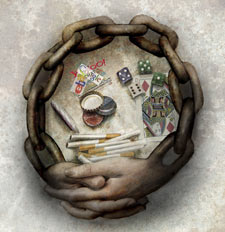As the controversial new psychological diagnosis manual, the DSM-5, is being debated and discussed by prominent psychologists, many changes have been put into the limelight, including the inclusion of cannabis withdrawal as a disorder. The concept of marijuana withdrawal is a controversial one-- some say it doesn't exist, and others say that it's an important part of marijuana. If it does exist, it is certainly subtle. It seems to be that only opponents of cannabis use acknowledge its existence; actual users deny it. Are cannabis users correct by virtue of experience, or is it a denial based on bias?
In my opinion, to understand cannabis withdrawal, we must look at the reasons we smoke it in the first place. Its most widely recognized medical use is to aid chemotherapy patients in pain relief, nausea control, and appetite revival. It is also prescribed to those suffering from eating disorders (once again, to encourage appetite), anxiety disorders, and depression.
And what are the supposed symptoms of marijuana withdrawal? Irritability, anxiety, and a loss of appetite. Equal and opposite to the benefits that marijuana affords us. In my opinion, this is not withdrawal, but simply a return to sobriety. If you take something that improves your mood and your appetite, and then stop taking it, of course your mood and appetite are going to suffer. This is very different from, say, alcohol withdrawal, which produces muscle tremors and hallucinations. These symptoms (in most cases) were not present before the user became an alcoholic, and therefore, they present a new concern.
In my opinion, cannabis withdrawal is NOT a legitimate disorder and should NOT be included in the DSM-5.




